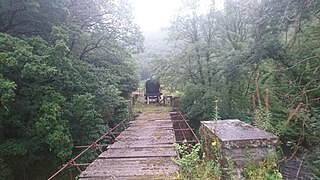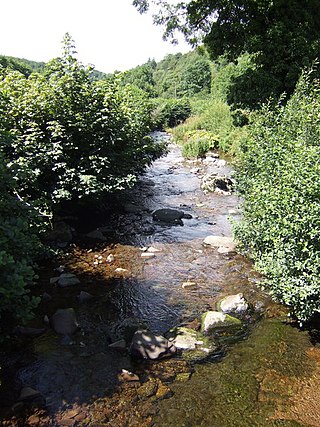
Abergwili is a village and community in Carmarthenshire, Wales, near the confluence of the rivers Towy and Gwili, close to the town of Carmarthen. It is also an electoral ward. Named after the village of Abergwili, the community includes the settlements of Peniel, Llanfihangel-uwch-Gwili and White Mill. The grounds of the former Bishop's Palace are listed on the Cadw/ICOMOS Register of Parks and Gardens of Special Historic Interest in Wales.

The River Towy is one of the longest rivers flowing entirely within Wales. Its total length is 120 km (75 mi). It is noted for its sea trout and salmon fishing.

The Gwili Railway is a Welsh heritage railway, that operates a preserved standard gauge railway line from the site of Abergwili Junction in southwest Wales along a four-and-a-half-mile (7.2 km) section of the former Carmarthen to Aberystwyth line. The original railway closed in 1965, with the track being lifted in 1975.

Carmarthen railway station is on the West Wales Line serving the town of Carmarthen, Wales, south of the River Towy, 245 miles 55 chains (395.4 km) from the zero point at London Paddington, measured via Stroud. The station is operated by Transport for Wales. Great Western Railway also run a limited service between Carmarthen and London Paddington, usually six trains each way daily with an additional return service to Bristol Parkway.

The River Lliedi has its source near Mynydd Sylen Llanelli and Llannon in Carmarthenshire, Wales. The river fills the Cwm-Lliedi Reservoirs and meets the sea at the Loughor Estuary at the former Carmarthenshire Dock, Llanelli.

The Carmarthen–Aberystwyth line was originally a standard-gauge branch line of the Great Western Railway (GWR) in Wales, connecting Carmarthen and Aberystwyth.

Bronwydd is a village and community in the county of Carmarthenshire, Wales, situated about three miles north of Carmarthen in the valley of the River Gwili. Bronwydd community comprises the village of Bronwydd Arms, a couple of nearby hamlets and a number of working farms in the surrounding area. In Census 2011, it had a population of 564.

Llanpumsaint is a village and community in Carmarthenshire, Wales. In the 2001 UK Census, Llanpumsaint community had a population of 595. It is not to be confused with Pumsaint, a small village some distance away on the River Cothi. The population increased in 2011 to 734, and thus the percentage of Welsh speakers declined.

Bronwydd Arms railway station, originally a stop on the now closed Carmarthen to Aberystwyth Line, is the headquarters of the preserved Gwili Railway.

Cynwyl Elfed is a village and community in the county of Carmarthenshire, Wales. The community includes the villages of Cynwyl Elfed, Blaenycoed and Cwmduad. It is situated about 5 miles (8.0 km) north of Carmarthen and had a population of 953 in 2001, increasing to 1,044 at the 2011 Census.

Llanllawddog is a community located in Carmarthenshire, south-west Wales. The population of the community taken at the 2011 census was 703, and at the 2021 census this had increased to 765.

Abergwili railway station served the village of Abergwili in Wales. It was the first station after Gwili Junction, the point where the line through it divided from the Carmarthen to Aberystwyth Line.

The Afon Gwydderig is a tributary of the Afon Brân. It rises as the Nant Gwydderig on the southern slopes of Mynydd Bwlch-y-groes, about 3 miles (4.8 km) North of the small village of Llywel, Powys. The A40 runs next to the river from Llywel as far as Llandovery, Carmarthenshire.

The Afon Brân is a tributary of the River Towy in mid Wales. Its headwaters rise in Irfon Forest in the northeastern corner of Carmarthenshire as the Cynnant Fawr and Afon Lwynor and the river assumes the name of Afon Brân at their confluence to the north of the village of Cynghordy. Its major tributary is the Afon Gwydderig which joins it at Llandovery. Other tributaries include the Nant Bargod, Cynnant Fach, Afon Gwyddon, Nant Hirgwm, Nant Cwm-neuadd, Bawddwr and Afon Crychan with its own minor tributary the Afon Dulais.
Llanpumpsaint was a railway station near the village of Llanpumpsaint, West Wales, serving the hamlet and the rural locale.

Conwil was a railway station near the village of Cynwyl Elfed in Carmarthenshire, Wales, serving the hamlet and the rural locale. It was once a thriving railway station, transporting both passenger traffic and locally produced goods, including wool, livestock, milk and timber.
Cwmgwili is a country house set in its own grounds approximately 2.5 km (1.6 mi) northwest of Abergwili in Carmarthenshire, Wales. It was probably built in the late sixteenth century.

Abergwili Junction railway station in the town of Abergwili, Carmarthenshire, Wales, is the southern terminus of the Gwili Railway.
















